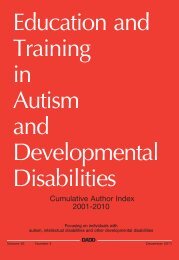Education and Training in Developmental Disabilities - Division on ...
Education and Training in Developmental Disabilities - Division on ...
Education and Training in Developmental Disabilities - Division on ...
You also want an ePaper? Increase the reach of your titles
YUMPU automatically turns print PDFs into web optimized ePapers that Google loves.
the rest of society until acted up<strong>on</strong> by God.<br />
Implicit <str<strong>on</strong>g>in</str<strong>on</strong>g> the message is the idea that those<br />
who are not healed or do not live well with a<br />
disability are <str<strong>on</strong>g>in</str<strong>on</strong>g> some way removed from God<br />
<str<strong>on</strong>g>and</str<strong>on</strong>g> therefore from the community.<br />
Islam<br />
Of the Abrahamic traditi<strong>on</strong>s, Islam is the most<br />
recent <str<strong>on</strong>g>and</str<strong>on</strong>g> <str<strong>on</strong>g>in</str<strong>on</strong>g> many ways the most <str<strong>on</strong>g>in</str<strong>on</strong>g>clusive of<br />
people with disabilities. The word Islam<br />
means “submissi<strong>on</strong> to the will of Allah”. Muslims<br />
believe that we are each born <str<strong>on</strong>g>in</str<strong>on</strong>g> the body<br />
that Allah <str<strong>on</strong>g>in</str<strong>on</strong>g>tends us to have. Allah is perfect<br />
as is his work. Therefore, to dish<strong>on</strong>or or exclude<br />
people with disabilities from civil society<br />
or religious life is to disrespect <str<strong>on</strong>g>and</str<strong>on</strong>g> disregard<br />
the will of Allah (Miles, 2002b). Health is<br />
benevolence from Allah, however, disease <str<strong>on</strong>g>and</str<strong>on</strong>g><br />
disability are not expressi<strong>on</strong>s of div<str<strong>on</strong>g>in</str<strong>on</strong>g>e punishment<br />
or wrath. Rather, disability tests <str<strong>on</strong>g>in</str<strong>on</strong>g>dividuals<br />
<str<strong>on</strong>g>and</str<strong>on</strong>g> <str<strong>on</strong>g>in</str<strong>on</strong>g> the process allows opportunities<br />
for at<strong>on</strong>ement (Rispler-Chaim, 2007). <str<strong>on</strong>g>Disabilities</str<strong>on</strong>g><br />
are c<strong>on</strong>sidered normal aspects of the human<br />
experience by the Qu’ran <str<strong>on</strong>g>and</str<strong>on</strong>g> Islamic<br />
law as evidenced by the prescripti<strong>on</strong>s for how<br />
<str<strong>on</strong>g>and</str<strong>on</strong>g> to what extent <str<strong>on</strong>g>in</str<strong>on</strong>g>dividuals with disabilities<br />
can <str<strong>on</strong>g>and</str<strong>on</strong>g> should participate <str<strong>on</strong>g>in</str<strong>on</strong>g> religious <str<strong>on</strong>g>and</str<strong>on</strong>g><br />
secular life (Miles, 2001; Rispler-Chaim). The<br />
Hebrew Bible <str<strong>on</strong>g>and</str<strong>on</strong>g> Christian Old Testament<br />
describe the ways <str<strong>on</strong>g>and</str<strong>on</strong>g> extents to which participati<strong>on</strong><br />
<str<strong>on</strong>g>in</str<strong>on</strong>g> religious <str<strong>on</strong>g>and</str<strong>on</strong>g> social life should be<br />
limited or restricted for people with disabilities.<br />
Islamic law <str<strong>on</strong>g>and</str<strong>on</strong>g> the Qu’ran call explicitly<br />
for the <str<strong>on</strong>g>in</str<strong>on</strong>g>clusi<strong>on</strong> of people with disabilities <str<strong>on</strong>g>in</str<strong>on</strong>g><br />
social life through emphatic denials of ideas<br />
about c<strong>on</strong>tagi<strong>on</strong> or polluti<strong>on</strong> associated with<br />
disability (Rispler-Chaim). Participati<strong>on</strong> <str<strong>on</strong>g>in</str<strong>on</strong>g> religious<br />
life <str<strong>on</strong>g>and</str<strong>on</strong>g> activities are required of all<br />
Muslims, with or without disabilities. Accommodati<strong>on</strong>s<br />
are offered to people with disabilities<br />
to make their participati<strong>on</strong> <str<strong>on</strong>g>in</str<strong>on</strong>g> religious<br />
life possible to the greatest extent. They are<br />
also excused without c<strong>on</strong>sequence from religious<br />
requirements that are simply bey<strong>on</strong>d an<br />
<str<strong>on</strong>g>in</str<strong>on</strong>g>dividual’s ability. The <str<strong>on</strong>g>in</str<strong>on</strong>g>dividual is clearly<br />
not def<str<strong>on</strong>g>in</str<strong>on</strong>g>ed socially or religiously by his disability<br />
(Miles). In marked c<strong>on</strong>trast to its Abrahamic<br />
predecessors, Islam treats people with<br />
disabilities as fully participat<str<strong>on</strong>g>in</str<strong>on</strong>g>g members of<br />
the social <str<strong>on</strong>g>and</str<strong>on</strong>g> spiritual community (Miles).<br />
Perhaps more so than the other two Abrahamic<br />
traditi<strong>on</strong>s, the Qu’ran <str<strong>on</strong>g>and</str<strong>on</strong>g> its teach<str<strong>on</strong>g>in</str<strong>on</strong>g>gs<br />
also functi<strong>on</strong> as the basis for modern civil law<br />
<str<strong>on</strong>g>in</str<strong>on</strong>g> Islamic societies. As far back as the seventh<br />
century Muslim courts were debat<str<strong>on</strong>g>in</str<strong>on</strong>g>g whether<br />
or not men with <str<strong>on</strong>g>in</str<strong>on</strong>g>tellectual disabilities should<br />
be allowed to own property. Arguments<br />
around the issue would be c<strong>on</strong>sidered progressive<br />
today. A man who may not manage<br />
property because of an <str<strong>on</strong>g>in</str<strong>on</strong>g>tellectual disability<br />
should still be allowed to try to do so. On the<br />
other h<str<strong>on</strong>g>and</str<strong>on</strong>g> is it the resp<strong>on</strong>sibility of the community<br />
to prevent potential harm from com<str<strong>on</strong>g>in</str<strong>on</strong>g>g<br />
to this man by protect<str<strong>on</strong>g>in</str<strong>on</strong>g>g him from the<br />
risk of los<str<strong>on</strong>g>in</str<strong>on</strong>g>g property as a result of his <str<strong>on</strong>g>in</str<strong>on</strong>g>ability<br />
to manage it? The debate tends to give<br />
more weight to the idea that to deny a man<br />
the right to own property is a greater harm<br />
than would come to him were he to lose his<br />
property (Miles). Additi<strong>on</strong>ally, part of h<strong>on</strong>or<str<strong>on</strong>g>in</str<strong>on</strong>g>g<br />
the will of Allah, accord<str<strong>on</strong>g>in</str<strong>on</strong>g>g to the Qu’ran,<br />
is the idea that people <str<strong>on</strong>g>in</str<strong>on</strong>g> a community are<br />
resp<strong>on</strong>sible for each other because each pers<strong>on</strong><br />
is created by Allah <str<strong>on</strong>g>and</str<strong>on</strong>g> should be h<strong>on</strong>ored<br />
as such. A practical c<strong>on</strong>sequence of this teach<str<strong>on</strong>g>in</str<strong>on</strong>g>g<br />
is an enhanced sense of community resp<strong>on</strong>sibility<br />
for provid<str<strong>on</strong>g>in</str<strong>on</strong>g>g people with disabilities<br />
with what they are unable to provide for<br />
themselves (Miles). C<strong>on</strong>tradicti<strong>on</strong>s exist however,<br />
between Qu’ranic teach<str<strong>on</strong>g>in</str<strong>on</strong>g>gs that Allah is<br />
perfect <str<strong>on</strong>g>and</str<strong>on</strong>g> therefore people are created as<br />
Allah <str<strong>on</strong>g>in</str<strong>on</strong>g>tends them to be, <str<strong>on</strong>g>and</str<strong>on</strong>g> teach<str<strong>on</strong>g>in</str<strong>on</strong>g>gs that<br />
“for each illness, Allah has provided a remedy”<br />
(Miles). In practical terms, modern Muslims<br />
may f<str<strong>on</strong>g>in</str<strong>on</strong>g>d themselves c<strong>on</strong>fused as to the appropriateness<br />
of <str<strong>on</strong>g>in</str<strong>on</strong>g>terventi<strong>on</strong>s that can alter a<br />
state of disability. Such acts might be <str<strong>on</strong>g>in</str<strong>on</strong>g>terpreted<br />
as an act of rebelli<strong>on</strong> or an avoidance<br />
of a trial Allah has <str<strong>on</strong>g>in</str<strong>on</strong>g>tended for the pers<strong>on</strong>.<br />
Overall, the Qu’ran <str<strong>on</strong>g>and</str<strong>on</strong>g> Islamic law are<br />
most remarkable <str<strong>on</strong>g>in</str<strong>on</strong>g> the relative little they say<br />
about people with disabilities compared to the<br />
other Abrahamic traditi<strong>on</strong>s. As previously discussed,<br />
images of disability are used repeatedly<br />
<str<strong>on</strong>g>in</str<strong>on</strong>g> the Hebrew <str<strong>on</strong>g>and</str<strong>on</strong>g> Christian Bibles as<br />
representati<strong>on</strong>s of God’s wrath, punishment<br />
for s<str<strong>on</strong>g>in</str<strong>on</strong>g>s, metaphors for turn<str<strong>on</strong>g>in</str<strong>on</strong>g>g away from<br />
God, or to provide opportunities for dem<strong>on</strong>strati<strong>on</strong>s<br />
of div<str<strong>on</strong>g>in</str<strong>on</strong>g>e benevolence <str<strong>on</strong>g>and</str<strong>on</strong>g> greatness<br />
through miraculous heal<str<strong>on</strong>g>in</str<strong>on</strong>g>g. These narratives<br />
are c<strong>on</strong>spicuously absent from Islamic writ<str<strong>on</strong>g>in</str<strong>on</strong>g>gs<br />
(Miles, 2001; Rispler-Chaim, 2007). Bey<strong>on</strong>d<br />
efforts to clearly articulate ideas of <str<strong>on</strong>g>in</str<strong>on</strong>g>clusi<strong>on</strong><br />
<str<strong>on</strong>g>and</str<strong>on</strong>g> civil protecti<strong>on</strong>, relatively little else is said<br />
about people with disabilities. A possible rea-<br />
Multiculturalism, Religi<strong>on</strong>, <str<strong>on</strong>g>and</str<strong>on</strong>g> Disability / 299

















